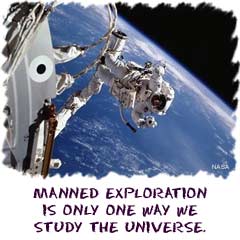|
|
||||||||||||||||||||||||||||
 |
|

|
||||||||||||||||||||||||||
Space Science Astronomy is the study of space. If you were an astronomer, you might focus on galaxies, stars, planets, or traveling objects such as comets and asteroids. Don't get astronomy confused with astrology. Astrology is a form of mystical prediction based on the stars and the time of year. Horoscopes are based on astrology. Astronomy is grounded in science. Astronomy uses math and science to study and predict the actions of the universe.
Astronomy is the study of space. If you were an astronomer, you might focus on galaxies, stars, planets, or traveling objects such as comets and asteroids. Don't get astronomy confused with astrology. Astrology is a form of mystical prediction based on the stars and the time of year. Horoscopes are based on astrology. Astronomy is grounded in science. Astronomy uses math and science to study and predict the actions of the universe.
To be a good astronomer, you need to understand its history of scientific discoveries. Over thousands of years, humans have developed and proved many ideas about space. Proving the fact that the Earth revolved around the Sun was one of the first major accomplishments of modern astronomy. As you learn more, you will find out that ancient societies understood the movement of the Earth long before it was accepted by ruling powers. We are now using orbiting telescopes to photograph possible black holes (Hubble, Chandra). There are still thousands of unanswered questions. This science will depend on a long future of exploration. Space ExplorationHumans rarely visit other planets. Humans do take pictures of other universal bodies. From those pictures we study the colors, movement, and composition of other objects in the universe. Astronomers need to understand the sciences of Earth because this is the only place we can study firsthand. Astronomers work with chemistry when studying the atmospheres on other planets. Astronomers need to understand geology to explain the structure of planets and stars. Astronomers also need to know physics to explain how objects move through the universe.The countries of the world are currently building a space station that orbits the Earth. This is the first step in our efforts to colonize and study the Solar System. One day (maybe in your lifetime), there may be groups of scientists working on the Moon and Mars. As time passes, Earth will also send more probes into deep space to study the outer planets and the interstellar region outside of our system. Even though the study of space has been going on for thousands of years, we have only been able to study the universe firsthand for about 40 years. Next From NASAIn 2006, NASA announced that its new exploration vehicle would be called Orion. The Constellation Program will develop the new spacecraft and its launching technology (Ares rockets). The new manned capsule will have the latest technology and be the foundation for missions to the Moon and Mars. |

|
|||||||||||||||||||||||||||
Useful Reference MaterialsEncyclopedia.com (Space Program):http://www.encyclopedia.com/topic/Space_Program.aspx Wikipedia (Space Exploration): http://en.wikipedia.org/wiki/Space_exploration Encyclopædia Britannica: http://www.britannica.com/EBchecked/topic/557348/space-exploration | ||||||||||||||||||||||||||||
|
RETURN TO TOP or Search for more information... * The custom search only looks at Rader's sites. |
|||||||||||||||||||||||||||
©copyright 1997-2015 Andrew Rader Studios, All rights reserved. Current Page: Cosmos4Kids.com | Space Exploration | Introduction |
||||||||||||||||||||||||||||
|
|
||||||||||||||||||||||||||||

